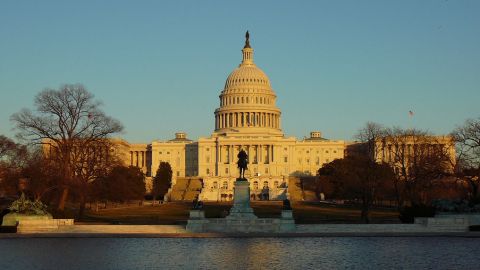A New Bipartisan Consensus Emerging on Gay Marriage?

UPDATE: 6.14.11: New York Legislature Set to Vote on Gay Marriage Legislation.
Republican State Senator Greg Ball says so-called “religious exceptions” in the legislation are the key to his vote and that of other Republicans.
NYTimes: One Vote Away
What’s the Big Idea?
The New York State Legislature is expected to vote on a bill to legalize same sex marriage this week, reviving an effort that failed in the state two years ago. Added to the momentum behind the bill is the fact that the popular Governor Andrew Cuomo has made it a legislative priority. Cuomo had previously stated that the bill would not go to a vote if we was unable to move lawmakers who opposed gay marriage in 2009. The tide appears to be turning.
According to a recent Quinnipiac Poll, a large majority of New Yorkers support gay marriage, with 58 percent in favor and 36 percent opposed. In fact, the country as a whole has also been steadily moving in this direction, as evidenced by recent national polls such as one by Gallup that found a majority–53 percent–in favor of gay marriage. This finding was remarkably consistent with four other reputable national polls released this year. Indeed, public sentiment on this issue has evolved very rapidly. The Gallup Poll, which began tracking support for gay marriage in 1996, found only 27 percent in favor and 68 percent opposed in its initial survey that year. Just last year, the percentage in favor stood at 44 percent.
This support has mostly coalesced around Democrats and Independents, while an equally significant percentage of Republicans and Tea Party-affiliated voters remain opposed. That should not be all that surprising if we consider how Karl Rove famously employed this so-called “wedge issue” to galvanize support among social conservatives for George W. Bush’s reelection in 2004. But what a difference seven years makes. The evidence is mounting that gay marriage will be in the background this election cycle. Republican leaders seem to be either ignoring the issue, if not endorsing it.
Glenn Beck, for instance, has stated that gay marriage is not “a threat to the country.” Former Bush administration Solicitor General Ted Olsen led the legal battle for the repeal of California’s Proposition 8. Most importantly, an idea is gaining traction, and has been endorsed by a growing number of Republicans, that opposition to gay marriage is fundamentally inconsistent with the party’s political philosophy of personal freedom and limited government.
What’s the Significance?
While five other states already allow same sex marriage (laws in California and Maine were overturned by statewide referendums), the passage of this bill in New York State–where it stalled two years ago in the face of unanimous Republican opposition–would be a significant development and undoubtedly send a signal to the rest of the country. After all, unlike 2009, when the New York State Legislature had a Democratic majority, this body is now controlled by Republicans. In order to pass the legislation it will require at least some Republican support, signalling a more bipartisan consensus on same sex marriage in the country’s third largest state. At a press conference on Monday, Senator James S. Alesi became the first Republican to come out in support of the law.
UPDATE: 6.14.11: Alesi now predicts the bill will pass with 35 votes (meaning he expects five Republicans to support it).
The ramifications of this legislation could reverberate well beyond New York. After the Obama administration reversed its policy regarding the Defense of Marriage Act, there is no federal law prohibiting states to enact their own measures, and, as Nancy Pelosi tells Big Think, the battleground where this issue is going to be decided is at the state level.
Some might say let’s not get ahead of ourselves too fast. After all, there was near universal support among the seven Republican candidates featured in a CNN debate last night for a constitutional amendment defining marriage as between a man and a woman. However, even the very socially conservative Michele Bachmann was careful to qualify her remarks: “I would not be going into the states to overturn their state law,” she said.
Furthermore, gay rights organizations–whose lobbying influence is more limited at the federal level–have become major players in states like New York and others. In 2009, organizations like the Empire State Pride Agenda successfully lobbied for a floor vote on gay marriage, forcing senators to take up or down votes and show where they stood on the issue.
Big Think has interviewed a number of prominent Republicans who are advocates for same-sex marriage, including Ken Mehlman, the former head of the Republican National Committee. Mehlman tells Big Think, “The party of Lincoln ought to encourage the community that is built when two people who love each other decide they’re going to spend their whole lives together.” The current leaders of the Republican Party need to “look in the mirror,” he says, and confront their conflicting ideologies.
Watch here:





